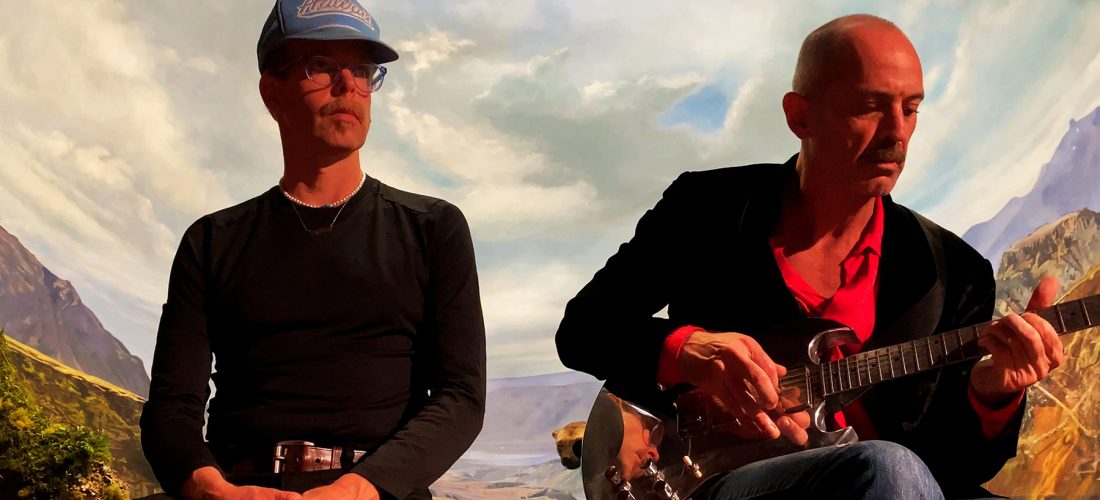Matt Sweeney and Bonnie ‘Prince’ Billy’s Duo Strengthens With Age on ‘Superwolves’
There’s a certain kind of lyric that Will Oldham excels at writing and delivering, where he sketches out a vaguely unnerving scenario and allows it to hang there in the listener’s mind, offering no assurance whatsoever that everything will turn out OK. A potent example comes on “Not Fooling,” the final track of Superwolves, the singer-songwriter’s rich, surprising, and deeply fulfilling new collaborative album with guitarist and co-writer Matt Sweeney, and a sequel to the pair’s 2005 collection Superwolf. “All your assumptions/Are righteous nightmares,” he sings, embodying a character who’s informing his associates on his way out the door that they’re in deeper than they thought. “Our screams together/Ever longer.” Sweeney’s guitar lines, an artful weave of acoustic and electric riffs and builds, converge into a whirling waltz as Oldham delivers the song’s sly kicker: “It’s been real.”
As heard here, the two are perfectly matched collaborators — in their duo, Oldham writes the words and Sweeney the music — which helps to explain why Superwolf has become a cult classic, beloved by everyone from Rick Rubin to Neil Young. Sweeney and Oldham’s rapport may have something to do with the fact that, during roughly the past 30 years, each has carved out a similarly specialized niche in contemporary music, somewhere between underground and mainstream, and somehow apart from either. Oldham, who started out leading Palace Brothers and has performed as Bonnie “Prince” Billy since the late Nineties, has a robust solo discography on Drag City, collaborations with everyone from Björk to Johnny Cash on his CV, and covers of both the Misfits and Merle Haggard in his repertoire; Sweeney, meanwhile, has backed Iggy Pop onstage, appeared on records by Adele and Neil Diamond, played in Billy Corgan’s short-lived Zwan, and fronted the bruising yet melodic post-hardcore outfit Chavez.
Just as you can’t pin either musician to a genre or scene, you can’t really compare their skill sets to anyone else’s. Oldham is a fiercely dedicated old-school songsmith who’s resisted at every turn the notion that his writing should be in any way confessional. He also happens to have one of the most arresting voices of his generation: earthy, elastic, and somehow out of time, often sounding as if it’s issuing from a mouth seen in an old sepia-toned photograph. As a guitarist, Sweeney is no show-off, but spend enough time with his work, and it’s clear that he’s an unassuming master, comfortable with any form of rock, or its many tributaries and offshoots; alongside Oldham, he is, from moment to moment, anything from a folky fingerpicker to a psychedelic shredder. Their obvious mutual appreciation — Sweeney has called Oldham his favorite singer, full stop, and Oldham has referred to Sweeney as a “private tour-guide ranger,” opening his ears to all kinds of musical wonders — means that when they work together, their gifts multiply and combust.
Superwolves features a larger cast than its predecessor, with Tuareg guitar marvel Mdou Moctar and his bandmates appearing on a few tracks, such as the trippy, way-more-whimsical-than-it sounds rocker “Hall of Death.” But as with Superwolf, the record’s strongest moments are the ones that show off Oldham and Sweeney’s sturdy rapport in the sparest way. “Good to My Girls” is a classic Oldham character study that depicts a brothel madam with a clear-eyed view of her role, and her obligation to those that work for her: “I take them to the movies/I put food in their openings/I sew the holes in their lives shut/And temper any hoping.” Oldham’s tender delivery and Sweeney’s loping, tastefully layered parts make the narrator feel sympathetic and even noble. On “My Popsicle,” Sweeney’s eerie, descending melody line and spectral backing vocals heighten the intrigue of Oldham’s elliptical lyrics, and on “You Can Regret What You’ve Done,” his rootsy cadences play up the homespun quality of Oldham’s proverb-like lyrics.
As placid as the record can sound at times, the perverse bite that made Superwolf songs like “Beast for Thee” so alluring is never far from the surface. In “God Is Waiting,” after observing a devout character who has “come undone,” Oldham’s narrator proclaims, “God can fuck herself/And does/Hardcore.” And in “Make Worry for Me,” the singer fully embodies an unrepentant badass swaggering into town. “I got monsters inside me that must be born/Let me shut up my mouth now and blow this horn,” he sings, before passing the baton to Sweeney, who takes a smoldering fuzz-tone solo.
There are moments on Superwolves, like on the jaunty country tune “Resist the Urge” or a cover of the Gosdin Brothers’ outcast’s lament “There Must Be a Someone,” where the duo can fool you into thinking they’re traditionalists. But weirdness always seems to creep in around the edges, such as on the folk song “I Am a Youth Inclined to Ramble,” based on a version by the Northern Irish singer Paul Brady, where Moctar’s ecstatic leads bubble up to accent some of Oldham’s mightiest vocals on the album, or on “My Blue Suit,” in which surreal imagery (“Now you’re shaking, now exploding, make/Yours and mine united fight/We combine, then, all our efforts/Emanating bursts of light”) turns what seems like a back-porch tune into a wild fever dream.
But the most uncanny, and most impressive, thing about the record might be that the pair sound even more focused, and more comfortable in their unforced eccentricity, than they did on Superwolf. There’s really no one else out there making songs like this; let’s hope we don’t have to wait another 16 years for more.
